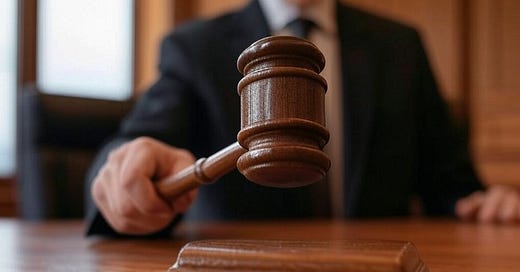Conservatives will force a non-confidence vote in January
Using this weird Parliamentary trick, the Conservatives will call the NDP's bluff
Moments ago, the Conservative Party announced they would force a non-confidence vote in Canadian Prime Minister Justin Trudeau's beleaguered Liberal government in January.
Many political observers have suggested that the earliest the Liberal government would face a non-confidence vote in the House of Commons would be sometime in March due to the Liberals being able to control when the opposition supply days are held. However, a different procedural tactic can be used to force a vote, and the Conservatives have elected to use it.
Here's how it will work.
Parliamentary committees have the power to pass motions to report various matters back to the House of Commons. Those reports can then be concurred into the House - a fancy way of saying that members can force a debate and a vote on them in the House of Commons (see Standing Order 66, here). So this morning, the Conservatives announced that they would use this procedure to force a vote on a non-confidence motion by recalling a standing committee to start a debate on the motion.
This move is possible because the Conservatives have elected to move this motion through a committee for which they hold the Chair - the House of Commons Standing Committee on Public Accounts. Standing Committee Chairs can call committee meetings even when the House of Commons isn't in session. So this morning, Conservative Member of Parliament John Williamson, the Public Accounts Committee Chair, announced that he would call a meeting on January 7, 2025, to consider a simple non-confidence motion.
If the motion passes at that meeting, it could be tabled in the House of Commons on its first day back (January 27, 2025) and then debated and voted on as soon as two sitting days later.
All of this is predicated on the cooperation of the NDP and Bloc on passing the motion at the committee and then allowing it to come to debate in the House of Commons, and the Liberals not proroguing (suspending) Parliament. In Mr. Williamson's rationale for calling the meeting, he referred to NDP leader Jagmeet Singh's announcement (conveniently released after the House of Commons rose last week) that he would vote non-confidence in the government.
By doing this, Williamson is essentially calling Mr. Singh's bluff, who, in interviews last week, referred to a non-confidence vote in March - after he becomes eligible for his pension at the end of February 2025. Should the NDP and Bloc cooperate, Williamson's gambit could see a vote happen at the end of January.
If the Liberals attempt to filibuster the motion at the committee stage to prevent it from passing, Williamson said he would schedule meetings throughout January until the debate collapses. It remains to be seen if Mr. Trudeau has enough loyal backbenchers to sustain a filibuster of that length.
As a side note, this motion should be raised via the Public Accounts Committee, given that the Liberal government delayed the release of the federal government's public accounts so long this year that many economic experts raised alarm bells over the government's lack of transparency.
The Liberal government should not be allowed to hobble along as Mr. Trudeau takes a ski vacation and considers his future.
Election, now.




